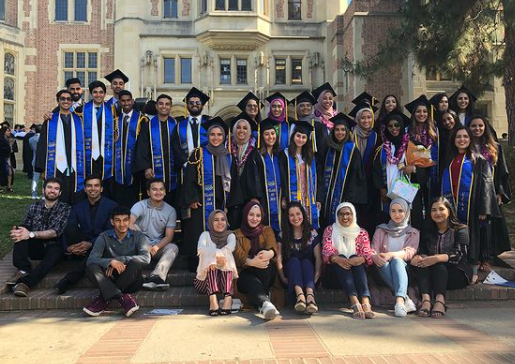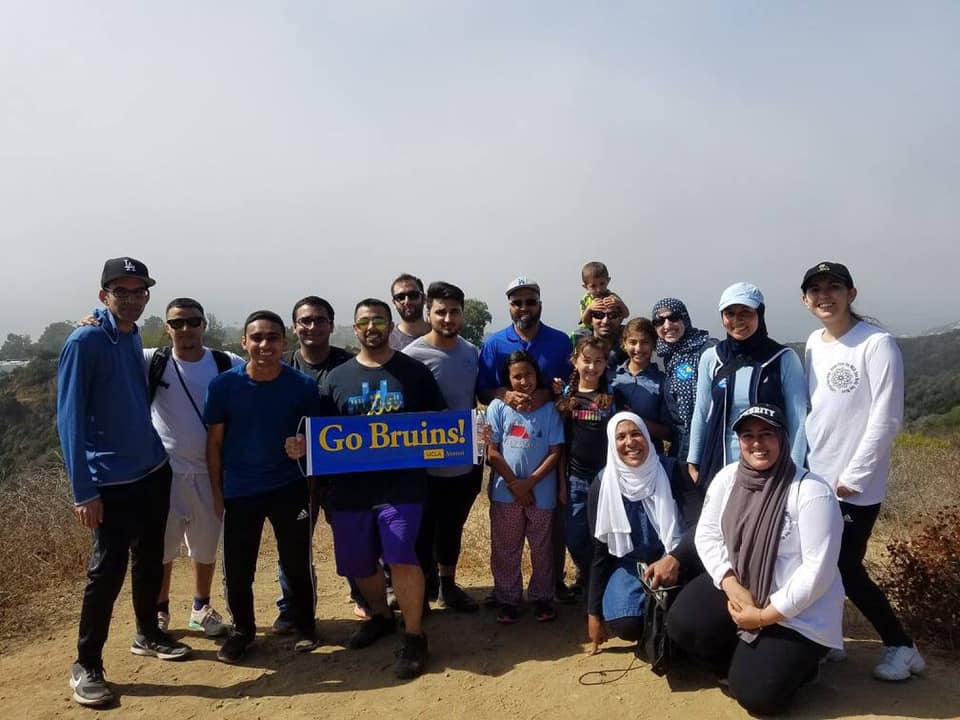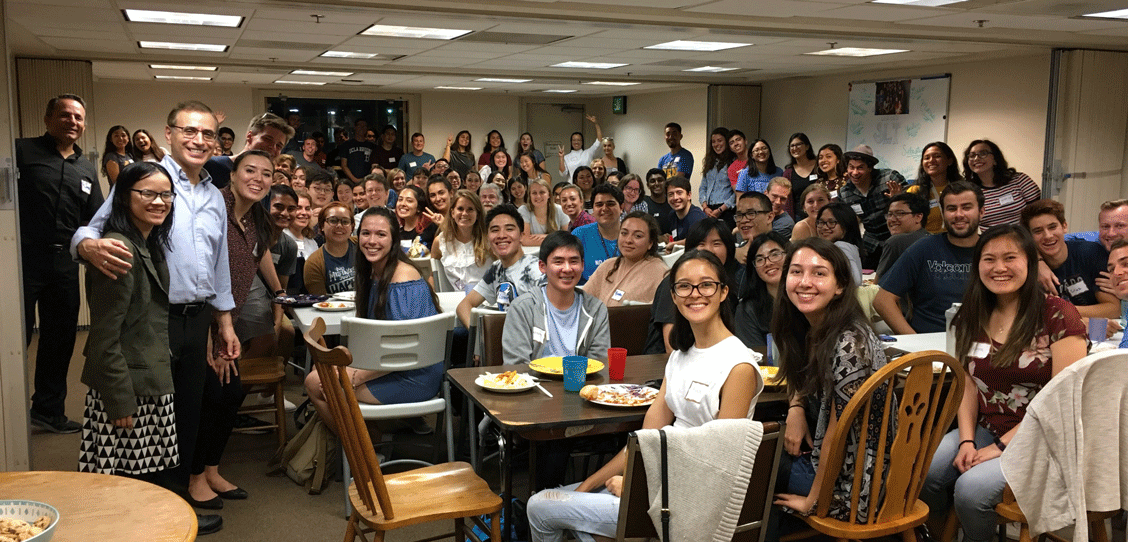Whether for culture, connection or spirituality, religion has played a role within UCLA’s
community since the University was established. In this new series, each month we aim
to look at two faith-based organizations on campus and how they have evolved. From
historical events and changes in political climate to the last year of remote instruction,
these groups have persisted and have fostered the spiritual growth of generations of
Bruins.
Islam on Campus
In the late 1960s and early 1970s, three of UCLA’s most high profile alumni and NCAA champion men’s basketball players converted to Islam — including Mahdi Abdul-Rahman ’64, who went by Walt Hazzard professionally; Keith Wilkes ’74, known as Jamaal Wilkes, who changed his name to Jamaal Abdul-Lateef; and basketball legend Kareem Abdul-Jabbar ’69, formerly known as Lew Alcindor.
Abdul-Jabbar studied many religious traditions as a student at UCLA. He has often discussed the impact of reading “The Autobiography of Malcolm X” as a college freshman while Abdul-Rahman, who later went on to coach at UCLA, expressed how he often had to keep his Islamic beliefs separated from his professional career due to backlash at the time.

MSA 2018 Commencement
While MSA continues to serve the purpose of a mosque at UCLA, as there are none
within walking distance, the Association now houses six community-oriented projects as
well, including the Mentors for Academic and Peer Support, which works with
underprivileged schools in the Los Angeles area; the UMMA Volunteer Project, which
serves as a free health clinic; and Al-Talib Newsmagazine, a publication housed in
UCLA Student Media.
“I would honestly liken it to being kind of like a small nonprofit that has a few different
areas and functions,” said Wali Kamal ’17, who was MSA president from 2014-15.
“There’s the social elements, like the religious spiritual elements, the volunteer
community service element and then there's the advocacy.”
From its inception, MSA has been grounded in its partnerships with other social and
cultural student organizations such as the Afrikan Student Union and Movimiento
Estudiantil Chicana/o de Aztlan, which campaigns for the access and retention of the
University’s Latinx students. In fact, around the time of 9/11, students from other
organizations would form protective circles around Muslim Bruins praying behind
Kerckhoff, Kamal added.
MSA has also been a firmament in on-campus political organization throughout the
years. In the past, it has held events such as a Muslim Awareness Week, aimed at
dispelling sterotypical notions about the religion. In 2017, the Association protested
against President Donald Trump’s immigration ban and stood up against the rise in
Hindu nationalism last year.
The official UCLA Muslim Alumni Association (UMAA) began in 2014, around the 50th
anniversary of MSA, and stemmed the connections between current MSA members and
active alumni at the time.

UMAA hike with chaplains
The pandemic has actually made operations of UMAA more far-reaching as Muslim
Bruins across the country and globe are more free to be involved, Kamal said.
“Now, there’s a greater focus on membership and career development in our activities,”
he said. Future plans for the UMAA are to continue the organization’s growth and
development, Kamal added.
UCLA’s Catholic Community
When UCLA moved from its Vermont Avenue campus to Westwood, the University
Catholic Center — then known as the UCLA Newman Center— relocated as well. From
1928 to 1941, the center was located in the original University Religious Conference
Center building, which has since been demolished.
In 1941, the then Diocese of Los Angeles purchased the Theta Phi Alpha sorority house
on 840 Hilgard, where the Center was situated for five decades and became known as
the University Catholic Center (UCC). Its current building, 633 Gayley Avenue, was
dedicated and opened on Dec. 4, 1999.

UCC at UCLA 2019 Thursday Student Dinner

Father Ted Vierra '53
UCC largely follows a liturgical calendar, an annual cycle of seasons and days observed
across Christian denominations. However, historical events, such as the Second World
War and the Vietnam War, often led to notable developments in UCC’s activities and
population, Vierra said.
“There was a great influx into the university because of the GI Bill and so there were a
lot of students coming into the Newman Club at that time,” he said. “...Then the Vietnam
war too, that really polarized (the University), like we’re going through polarization now.”
The Catholic Center also offers a lot of extracurricular activities, spanning education and
faith development, social justice, as well as community and outreach, said Amed Galo
Lopez, a fourth-year history student who is concurrently working towards a master’s
degree in African Studies.
“Back when I was a student leader, one of the 12 student leaders in the 2018-2019
school year,” Lopez said, “I was part of the social justice ministry. And we did a lot of
great activities with the Catholic community as well as the student community on
campus.”
Mostly, UCC focuses on the study of religion at a university level, specifically in
conjunction with current events, social justice matters and service, Vierra said. Prepandemic, the Center would often hold Mass on Sundays and sometimes during the
week as well, he added. Thus, the last year of physical distancing has had a significant
impact on the Center’s operations.
“The University Catholic Center is about bringing people together, real human beings
together, and we haven’t been able to do that,” Vierra said. “The building is such that
almost every inch of the property is interior. There's no outdoor areas to gather in and
keep your distance, so it’s exceedingly difficult and a lot of it is just using the screen.”
One of the good things from the pandemic’s impact has been the growth of Zoom-based
faith groups with UCC’s Fellowship of Catholic University Students Missionaries
(FOCUS), Lopez said. Over time, and keeping in line with COVID-19 precautions, the
FOCUS missionaries have even held small in-person gatherings for religious study.
Other activities, such as the Center’s Cornerstone LGBTQ+ Group, have also
flourished, with new members taking the lead of virtual meetings, Lopez added.
From partaking in Holy Communion to confessions, a lot at UCC has changed. For
instance, the latter, where one shares their deepest thoughts with a priest, is now
undertaken with one standing six feet away instead of a traditional confessional box.
In the next three issues, we will feature various Christian, Jewish, Mormon and Buddhist student organizations at UCLA. If you have information to share about Bruin Faith Groups, send us a
comment at ConnectFeedback@alumni.ucla.edu.